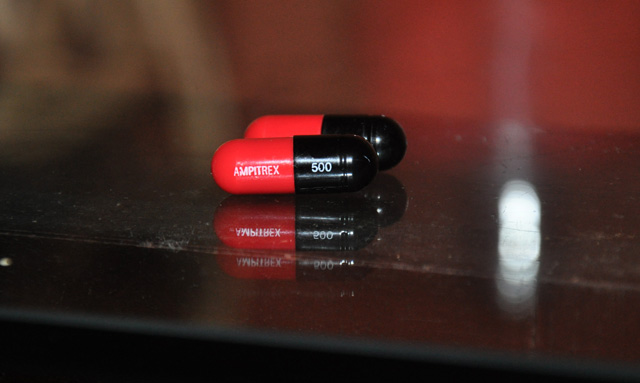By Kinvelyn Guaba
The Bronx Journal Staff Writer
Federico Sanchez, 34, is one of many Dominicans in New York City who does not have health insurance. Like many other Hispanic residents, he prefers to purchase imported antibiotics sold in bodegas, rather than at a local pharmacy, to relieve pains and illnesses.
Washington Heights has the largest population of Dominicans in New York. Trying to find these antibiotics, imported from the Dominican Republic (the DR), is as easy as finding Spanish restaurants.
One of the most popular antibiotics is Ampitrex, (Ampicilina 500mg), which is similar to penicillin, and is used to treat infections. The FDA has not approved Ampitrex for use in the US.
“I buy Ampitrex and Terramicina for infections in the eyes,” says Carmen Hierro, a 41-year-old from Washington Heights. Hierro only uses the pharmacy for medicine prescribed for her children. For herself, she goes to a bodega.
Many Dominicans use antibiotics like Ampitrex because they used it in the DR. Other immigrants, legal or otherwise, do not have access to health insurance. They use less health care and receive lower quality of care than the US-born population, according to Health Affairs, a non-profit international health care group. Sixty-five percent of undocumented immigrants lack health insurance, as well as 32 percent of permanent residents, according to the website. More than one fourth of Hispanics in the US do not have a health care provider, according to the Pew Hispanic Center.
Even among those who do have health insurance, many choose bodegas because it is more convenient. Some prefer to buy Ampitrex to avoid a day at the doctor’s office. They also save money purchasing these antibiotics because they cost from 75 to 90 cents.
However, some may suffer health problems. Antibiotics like Ampitrex usually require a doctor’s prescription and unregulated use can result in allergic reactions or other complications.

“I’m against imported antibiotics from any country,” says Dr. Alberto Comas. “Many countries have been counterfeiting antibiotics and then transport them to the United States. The person selling them only cares about the money. It is important to make sure that the medication is the right one.”
Patricia Saint-Hilaire, a nurse who works for Comas, adds that many people have been relying on Ampitrex to cure almost any sickness that deals with infection, which can lessen the effectiveness of antibiotics.
Amparo Rodriguez, a 46-year-old Dominican from Washington Heights, says that many people like herself are allergic to penicillin, which is similar to Ampitrex. “People who use it are risking their health,” she says.
Many wonder where and how these bodega owners get these antibiotics. Some immigrants buy the antibiotics when they travel to the Dominican Republic and sell them to bodegas in the New York City, says Andrew Guzman, 23.
Guzman explains that he knows someone who buys antibiotics and sells them to friends or acquaintances. “They pay her double what she paid for them,” he says.
Rene Alvarez, a bodega owner, says he brings them himself every time he takes a trip to the Dominican Republic. He adds that he keeps the medication in a bag, along with snacks like potato chips, cookies, and candy.
Usually the antibiotics are not advertised in the bodegas. But the practice has been going on for years. Most Dominicans, for example, know that along with Mamita ice cream and platano,they can ask for Ampitrex in Dominican-run corner stores.
Some bodegas are cautious about when they sell these medications, says Washington Heights resident Amparo Rodriguez. “They sell it to people they know because it’s illegal and they can get in trouble if word goes out.”
In addition to bodega antibiotics, many in Hispanic communities in New York City turn to herbal medicines from botanicas to treat their aches and pains.

Maguey root and plant
Herbal medicine is an old Hispanic tradition, passed down from ancestors who used plants to cure specific illnesses, such as wounds, fever, colds and headaches. Often it is used in the countryside, where money and transportation to a doctor are not easy to find.
Medicinal plants, such as lemon leaves and roots are examples. These plants are sold in botanicas across the city. The owner of one botanica in Washington Heights on 182nd Street says she gets almost 100 Hispanic customers per day who prefer to follow herbal traditions, instead of taking medicine.
They believe that herbal medicine can cure more than antibiotics, she says. For example, raiz de maguey, the root of the agave plant, is used to sanitize blood.
Rodriguez believes that medicinal plants are better than unprescribed antibiotics. “In a way it is better than Ampicillina because they are natural plants,” says Rodriguez. “But people use more of the antibiotics because it cures faster.”
She believes that the FDA has not approved some medicinal plants because doctors will lose money. Nurse Patricia Saint-Hilaire says care must be taken, even with these herbal remedies. “Plants are complicated because some are toxic,” she says.
However, for many Latinos, the benefits of alternative medical options — convenience and price — appear to outweigh potential risks. “Mucha gente le tiene miedo a los medicos (many people are afraid of doctors),” says Gisela Alcantara, 48.
Or, for some, it is a matter of “Simplemente no perder el tiempo (simply not wasting time),” says Mariano Tejeda. But he says, those who choose to use alternatives, such as Ampitrex, should be aware of the possible “consequencias.”




